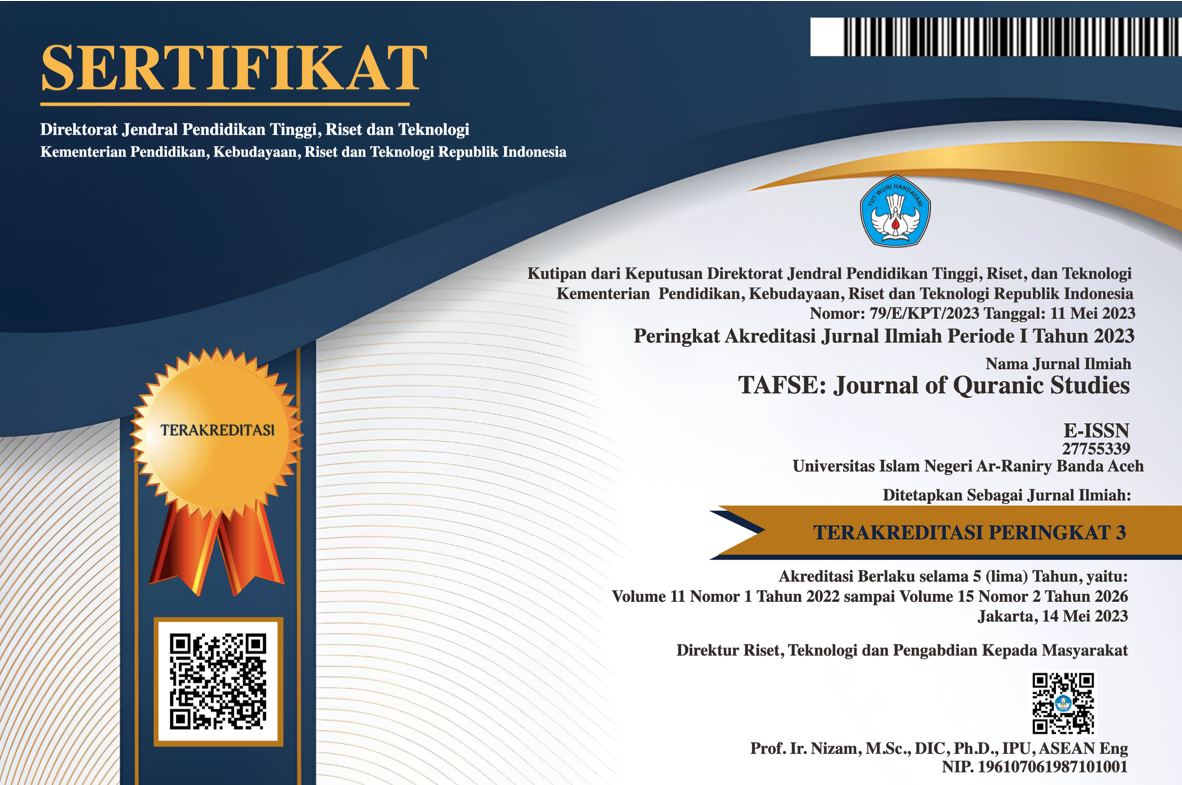Karakteristik Sifat Manusia dalam Tafsir Fi Zilal Al-Qur’an
DOI:
https://doi.org/10.22373/tafse.v1i1.14274Keywords:
Karakteristik Manusia, Sifat Tercela, Sayyid QutubAbstract
As a creature chosen to be the leader of the earth, Allah created humans with the highest perfection. But on the other hand, humans have bad traits such as complaining, impatient and miserly. This paper aims to explain the despicable traits that exist in humans according to the interpretation of Sayyid Qutub, so that Islam can stay away from these traits. An important finding in this study is that according to Sayyid Quṭub, the nature of complaining must be possessed by humans, both happy and difficult. However, this trait will be lost if humans can fulfill the conditions mentioned in the Qur'an, namely always in prayer, paying zakat, justifying the last day, guarding his privates, fulfilling promises and trusts, giving true testimony, and always keeping the prayer. Sayyid Quṭub's interpretation was influenced by the social and political life of his time, namely when the Egyptian people and their government were ignorant of Islamic values, damaged faith and morals, violence was everywhere, the government was unjust to society, adultery was rampant, and even the ulama were considered as parasites to do something that is considered good for him.
Sebagai makhluk yang dipilih untuk menjadi pemimpin di bumi, Allah menciptakan manusia dengan kesempurnaan tertinggi. Akan tetapi di sisi lain, manusia memiliki sifat yang jelek seperti berkeluh kesah, tidak sabar dan kikir. Tulisn ini bertujuan menjelaskan sifat-sfat tercela yang ada pada manusia menurut penafsiran Sayyid Qutub, sehingga Islam dapat menjauh dari sifat-sifat tersebut. Temuan penting dalam kajian ini bahwa menurut Sayyid Quṭub, sifat keluh kesah pasti dimiliki oleh manusia baik senang maupun susah. Namun, sifat tersebut akan hilang jika manusia dapat memenuhi syarat-syarat yang disebutkan dalam Al-Qur’an, yaitu senantiasa dalam salatnya, membayar zakat, membenarkan hari akhir, menjaga kemaluannya, menunaikan janji dan amanah, memberikan kesaksian yang benar, dan selalu menjaga salatnya. Penafsiran Sayyid Quṭub dipengaruhi oleh kehidupan sosial dan politik pada masanya, yaitu pada saat rakyat Mesir dan pemerintahannya abai terhadap nilai-nilai Islam, rusaknya akidah dan moral, kekerasan dimana-mana, pemerintah berlaku zalim terhadap masyarakat, perzinaan merajalela, bahkan ulama dianggap sebagai benalu untuk melakukan sesuatu hal yang dianggap baik baginya
Downloads
References
Abdul Fattah al-Khalidi, Shalah. Pengantar Memahami Tafsir Fῑ Ẓilāl Alquran Sayyid Quṭub. cet. I. Surakarta: Era Intermedia, 2001.
Abd al-Fattah al-Khalidi, Shalah. Sayyid Quṭub Mengungkap Amerika. Surabaya: SaranaIlmiah Press, 1990.
Chadidjah Nasution, Seni Penggambaran dalam Alquran. cet.8. Yogyakarta: Nur Cahaya, 1981.
Hadhiri SP, Choiruddin. Klasifikasi Kandungan Alquran. Jakarta: Gema Insani Press, 1993.
Ismail, A.Ilyas. Paradigma Dakwah Sayyid Quṭub: Rekontruksi Pemikiran Dakwah Harakah. cet. I. Jakarta: Penamadani, 2006.
Khalil al-Khatan, Manna’. Studi Ilmu-Ilmu Qur’an. cet.9. Bogor: Pustaka Litera Antar Nusa, 2006.
L. Esposito, Jhon. Ancaman Islam: Mitos atau Realitas. Bandung: Mizan, 1994.
Musthafa Al-Maraghi, Ahmad. Terjemah Tafsir Al-Maraghi, terj. Bahrun Abu Bakar. Semarang: CV Toha Putra, 1985.
Rahman, Fazlur. Tema Pokok Alquran, Bandung: Pustaka Kautsar, 1996.
Syalisy, Ali. al-Tamarrud ‘ali al-Adab: Dirasat fi Tajribat Sayyid Quṭub. Beirut: Dar al-Syuruq, 1994.
Tim Penyusun. Ensiklopedia Islam. Jilid 4. Jakarta: Ichtiar Baru Van Hoeve, 1993.
Quṭub, Sayyid. Tafsir Fῑ Ẓilāl Alquran. terj. As’ad Yasin dan Abdul Ajiz, juz 29, jilid 23. Beirut: Darusy-Syuruq, 1992.
Downloads
Published
Issue
Section
License
Authors who publish with this journal agree to the following terms:
- Authors retain copyright and grant the journal right of first publication with the work simultaneously licensed under a Creative Commons Attribution License (CC BY NC 4.0) that allows others to share the work with an acknowledgment of the work's authorship and initial publication in this journal.
- Authors are able to enter into separate, additional contractual arrangements for the non-exclusive distribution of the journal's published version of the work (e.g., post it to an institutional repository or publish it in a book), with an acknowledgment of its initial publication in this journal.
- Authors are permitted and encouraged to post their work online (e.g., in institutional repositories or on their website) prior to and during the submission process, as it can lead to productive exchanges, as well as earlier and greater citation of published work (See The Effect of Open Access).





